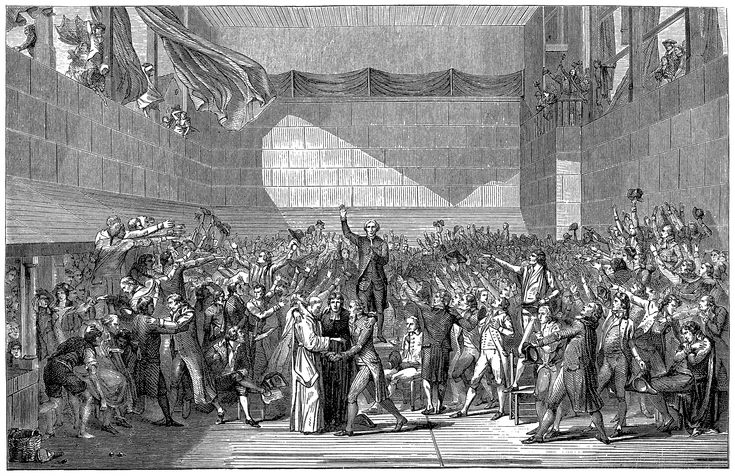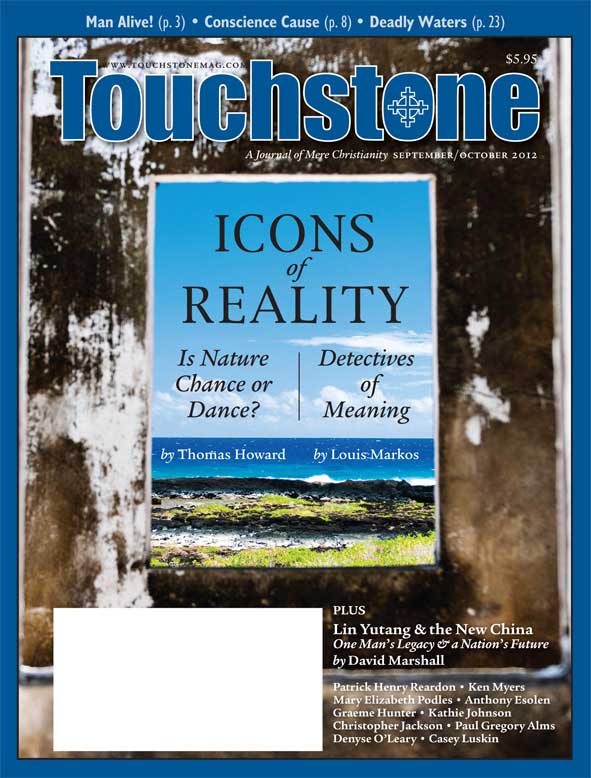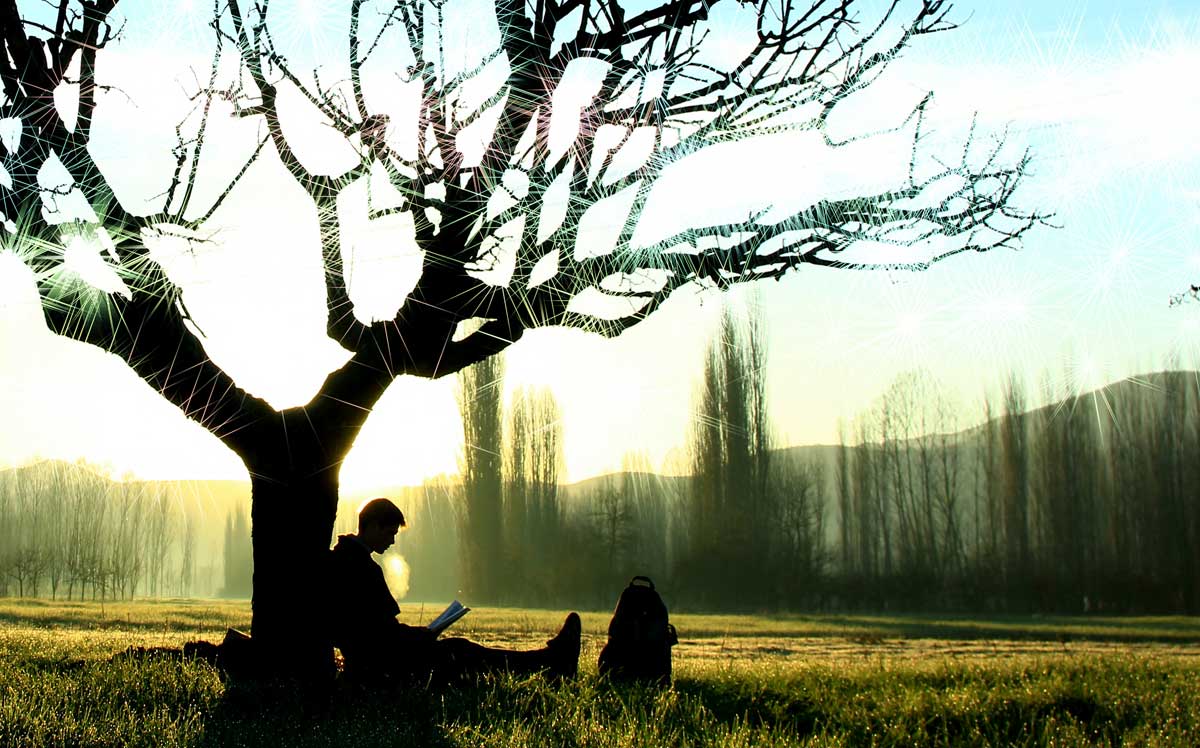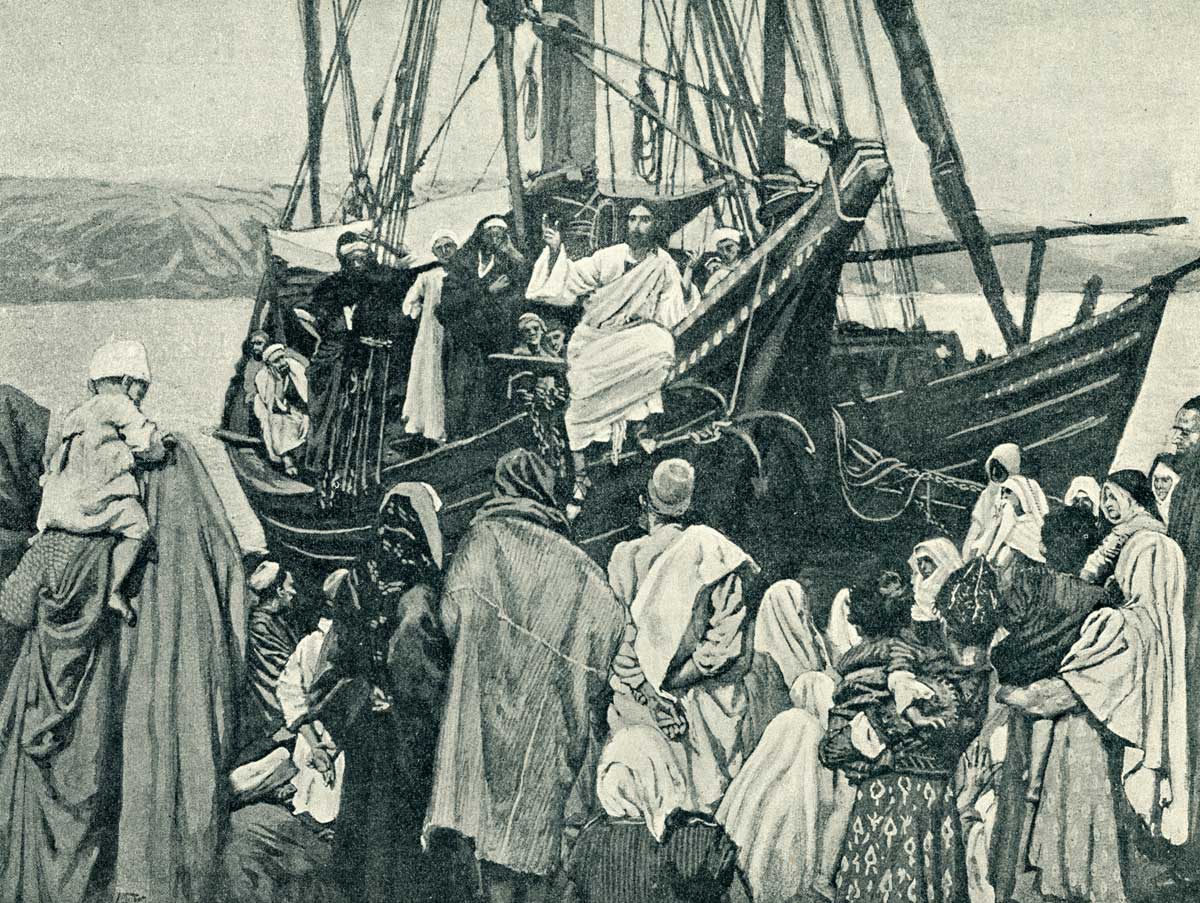Changing Times & Permanent Things
An Inquiry into "Progressive" Ideas in Light of the Moral Universe
An odd sodality convenes at my house monthly. We are academics, which guarantees that we are all garrulous, for one thing, and for another, that we are all vastly impressed with our own perspicacity. Everyone in the group (there are about ten of us) would lay claim to some sort of Christian faith. Although each one hails originally from the Evangelical sector of Protestantism, some have now opted for flat Protestant modernism, others are now Anglican, and at least one would find himself in the Ultramontanist (read "extreme") reach of the Roman Catholic Church.
At times the talk turns to the nettlesome moral questions that loom in the public mind now: abortion, homosexuality, contraception, assisted suicide, and so forth.
The approach on the part of one or two in the group when it comes to such points is one of cautious hesitation. Abortion? Well now, that's a vexed question. It's difficult to know quite what to say on the topic when one thinks of abused women, malformed infants, penury, quality of life, inconvenience, and so forth. Who would wish to be inquisitorial? Or again, homosexuality: we all, obviously, recognize the distinction between a man's coping with "same-sex attraction" on the one hand, and, on the other, his opting into an active "lifestyle" therein; but on this latter point, the house is divided. Contraception? Surely it has long since ceased to be an issue? "Times have changed," and "we now know" that no moral category need be invoked in this connection.
Zeal quickly comes into play when such topics are mooted. "Well, X, or Y, or Z has the character of sin—even of mortal sin—that's pat." This from the Ultramontanist, or, possibly, from a few representing the classical Reformation tradition. Or, "No: these are delicate issues and one can't be strident. Times have changed." This from those who wish to keep abreast of the times.

Disparate Views
For example, one of us whose moorings are in a loosely structured but nonetheless ardent sector of Protestantism, observed not long ago that he has come to feel that homosexual practices ought no longer to be placed under the interdict. His motive here is compassion. He has been very kind—pastoral, actually—to a student who found his bottled-up attraction for other men to be crushing. It was our friend's experience in this connection that had obliged him to set the traditional Mosaic and Pauline canons on one side in the name of compassion. His student was clearly in agony.
Another, troubled by the conundrums raised in his own mind by hermaphroditism, urges a fundamental re-casting of Judeo-Christian moral notions: such dismaying phenomena would seem to call for this. The patriarchs and apostles had never taken such anomalies into account. (I have not myself been able to get to the nub of his views here. But he urges that we must place the hermaphrodite at the start of any moral dicta we might wish to lay down. Somehow, on his view, the whole tradition is sadly flawed.)
Yet another would wish it to be understood that he is not, as it were, enthusiastic about abortion, but he passionately supports the present federal campaign to require every hospital, regardless of its religious foundation, to cooperate actively in making abortion and contraception convenient and available on demand to all women. He skirts the question of infanticide as perhaps an ambiguous but unavoidable corollary to the program.
As our discussions have proceeded (I almost said "ground along") month by month, I have found a question taking shape in my mind: What is it, then, that underlies this disparity of views on what have heretofore been assumed to be moral fixities, in a conclave of presumptively Christian scholars?
Change & Betterment
An answer to this question may possibly suggest itself in connection with the word "unnatural." For one of us to appeal to this word arouses unease in the bosoms of a few. Unnatural? The word seems to bespeak an attitude redolent of notions that have long since evaporated under the scrutiny of Baconian, Cartesian, Kantian, and Hegelian suppositions, that is to say, of the modern world. "The nature of things" is indeterminate, if there is such a thing at all. Hence, the word "unnatural" is otiose.
The word "fixity," with its strangling connotations, evokes pre-scientific ideas. In this connection, C. S. Lewis, in his inaugural address at Cambridge when he was installed in the new Chair of Mediaeval and Renaissance Literature, asked, "How has it come about that we use the highly emotive word 'stagnation', with all of its malodorous and malarial overtones, for what other ages would have called 'permanence'?" ("De Descriptione Temporum" in Selected Essays, Cambridge University Press, 1969, p. 10).
"Change," "development," "progress": such words form the axioms upon which the world now proceeds. So when one says, "Times are changing," what he may mean is: "Things are getting better."
If one is speaking of anesthesia or antiseptics or antibiotics, it would seem that he is on safe ground here. In other connections, a fugitive thought may flit through the mind of the man who is thinking of the actual good of the human race: isit "better" to get from New York to New Delhi in a few hours rather than a few months? Is it better to have instant access to universal information at the click of a key? Is the internal combustion engine an undoubted good? Is the covering of the earth with asphalt and concrete an undoubted good?
Such questions seem capricious. Obviously, only an agrarian or a Luddite (I would be a camp-follower here) could raise such questions with any grain of seriousness. But even happily modern men may find themselves mopping their brows and asking, "Where is it all going?" What "it" do they mean? Well, development, change, progress, one would suppose. Might we not find some judicious charioteer to govern the hurtling course of this Icarian plunge? But who will nominate such a charioteer? And we are up against questions that overthrow all conceivable suggestions.
Stubborn Moral Categories
When it comes to the moral universe however, it may be asked whether, in fact, "progress" is a word with any meaning. Obviously, the almost global modern decrying of slavery would seem to qualify as progress, although we may recall that ancient codes decried cruelty, under which rubric slavery would seem to appear. It is the violation of such codes (the Tao, that is) that has constituted most of the unhappiness of human history. From the beginning, the touchstone has been, "Would I be prepared to switch places with my slave?"
But, in the brisk air that now blows across contemporary thinking, may we, in fact, ponder some fundamental moral review?
Certain moral categories would seem stubborn here. Murder—that is, the gratuitous and unwarranted slaughter of a fellow mortal? Surely it will be some time before the Tao will recommend this. Or lying. The lie is a most useful tactic in all sorts of situations, but when one comes upon a lie that has inconvenienced his own interests, he has difficulty being open-minded. Stealing? Again, most profitable for the thief, but hard to applaud for the man whose sapphires have been pinched, or, a fortiori, the man whose identity has been electronically purloined.
Ah. But might there be, after all, a candidate for review? In the "sexual revolution" of the 1960s et seq., it would appear that the protohistoric ban on adultery, and with it fornication and free sexual congress across all frontiers of gender, was lifted. (Sparta is often offered as an ancient precedent for altering common sexual codes. But did Sparta herself attempt a brief adjusting of the Tao? She would be part of the question here, and not of the answer.)
So—the difficulties encountered in the efforts to modify the Tao in the cases of murder, lying, and stealing, would seem to arise in the sexual realm as well. The adulterer or fornicator will no doubt find vast gratification in his pastimes, but the offended party will take a dissenting view: "You have bedded my wife?" or "That was my boyfriend with whom you made free!" It is hard to gain a consensus, even in the realm of sexuality. Someone is sure to view the fruits of the revolution with the most somber misgivings.
Something Prior
But there are situations—millions of them no doubt, daily—in which no offended party would seem to appear. Just two people (or more, alas) in any mix of gender, enjoying a divertissement. No strings. No special commitments. No prior claims on either hand. Hence no offended parties. All would seem to be smooth sailing.
And here we find ourselves asking whether there is any prior court to which appeal to ancient taboos might be mounted in such situations. Will it be only on the level of common loyalties like family or betrothal or friendship that these taboos ought to be invoked? May the rest of us sail on at will?
It is here that I have found myself mulling over the views of my Christian colleagues. To remark "Times are changing" as the warrant for adjusting the Tao in the interest of sexual "needs" would, surely, find a stony response from the patriarchs, prophets, apostles, fathers, and the ancient Church generally. (Even sumptuously polygamous figures like Abraham or Solomon kept to fixed notions: "this woman is one of my wives or odalisques: you may not enjoy her." Pharaohs, khans, caliphs, sultans—they all appealed to some such canons.) There was clearly something prior to a man's desires, or even to his supposititious needs, when it came to ordering things in the sexual domain.
The ignoring of that "something" was, of course, and has always been, the fountainhead of half the fury, sorrow, and agony of the whole world. But on the workaday level of my desires, appetites, inclinations, and even "needs," might the time now have come for us all to invoke the canon "Times are changing," and to re-draw the moral map of the universe? Not a few of my Christian friends seem to see such a re-drawing as a step forward, certainly in the interest of compassion.
Such a move in the moral realm would seem both plausible and desirable while we are, in any case, overleaping so many frontiers. And surely it follows from the freedom that belongs to our human dignity, does it not?
The Paradox of Freedom
To a mind formed by doctrines of progress, and occupied with these proximate questions of our human desires and needs, all objections to updating ancient sexual canons will appear as obstructions.
On the other hand, T. S. Eliot spoke of "The Permanent Things." We could also speak of "the architecture of the universe" or "the bright fixities" or "the choreography of the Dance." We could even go so far as to speak of "the natural," and hence of "the unnatural."
We would be invoking the paradox, at work in every conceivable realm of reality, of fixity—immutable law—as being the very ground and donor of freedom. At one pole would stand the (briefly) attractive state of anarchy: no trammels, no tyranny, no checkrein on my impulses, convenience, and choices. At the other pole would appear the picture of the Dance: the stars in their courses; the mystery of time itself; the solemn choreography that yields the joyous freedom of the minuet, the waltz, and the ballet; the fixed rules that govern the training of the gymnast, the acrobat, and the athlete; the sovereign fidelity that beckons a man and a women into the dignity of the nuptial state; the interminable self-denial and obedience to the rules that equips a Beverly Sills or an Itzhak Perlman.
When this sort of thing is pondered, it begins to look as though obedience, mastery, freedom, and joy turn out to be a seamless fabric. The very "thou shalt nots" of the Law look like guarantors of our authentic human dignity and glory. Basic training, as it were.
Icons of Reality
And we may ponder here the sacramental notion that the material world is the icon of reality. Silver aspen leaves, the song of the hermit thrush, the surf, Mont Blanc, the taste of raspberries, grains of wheat,the body of a woman and the body of a man: these are either neutral data, or they signal Something. The Christian point of view has always supposed the latter.
It all becomes almost clinical: the structure of the man's body bespeaks a creature whose nature it is to lift and haul and defend the city, and to go out from himself to seek the place—the body of the woman in the fruition of their love. The structure of the woman's body would seem to suggest that she is already there. She is"the place." Even though she was, in the ancient story, created after the man, she is"at home" in a way that eludes the man. He charges about the world, restless, clubbing mastodons, probing the seven seas, cobbling up his philosophical systems or symphonies, conquering kingdoms, and writing, writing, writing. . . . The woman does not seem quite so hag-ridden to get things under control. Her very breasts and womb seem designed to receive.
This line of thought is scandalous, of course. Can't a woman command a ship or "do" philosophy (Edith Stein) or govern an empire (Elizabeth I, Catherine the Great, Victoria) or fight? Of course she can, valiantly and wisely. But is there a difficulty here? (Is Penthesilea your archetypal woman?).
Perhaps there is a key word there: archetype. Obviously, a woman can do virtually anything a man can do, except to sire offspring; and so with the man: he can caress his infant with profound tenderness, but he can't bear or nurse it. The two genders are not, pace the l970s, interchangeable, even with the best will in the world. Has the modern stress on equality and power in the public realm set on one side the most obvious Permanent Thing touching the phenomenon of Man, namely, man as Father, and woman as Mother? When these creational categories became "roles" in the l970s, did we witness progress? Was it a Good Thing to muster out the notion of the natural, with its corollary unnatural?
Something Unalterable
Is it thus with the whole Tao? Do the canons, at work in all tribes and cultures from the beginning in some form or another (e.g., sheer promiscuity has never been extolled) point to Something unalterable?
Christianity has supposed that they do. It is for this reason that I have found myself curious upon hearing my academic friends proposing alterations under the ensign "But times are changing." •
Thomas Howard taught for many years at St. John's Seminary College, the Roman Catholic seminary of the archdiocese of Boston. Among his many works are the books Christ the Tiger, Evangelical Is Not Enough, Lead Kindly Light, On Being Catholic, and The Secret of New York Revealed, and a videotape series of 13 lectures on "The Treasures of Catholicism" (all from Ignatius Press).
subscription options
Order
Print/Online Subscription

Get six issues (one year) of Touchstone PLUS full online access including pdf downloads for only $39.95. That's only $3.34 per month!
Order
Online Only
Subscription

Get a one-year full-access subscription to the Touchstone online archives for only $19.95. That's only $1.66 per month!
bulk subscriptions
Order Touchstone subscriptions in bulk and save $10 per sub! Each subscription includes 6 issues of Touchstone plus full online access to touchstonemag.com—including archives, videos, and pdf downloads of recent issues for only $29.95 each! Great for churches or study groups.
Transactions will be processed on a secure server.
more from the online archives
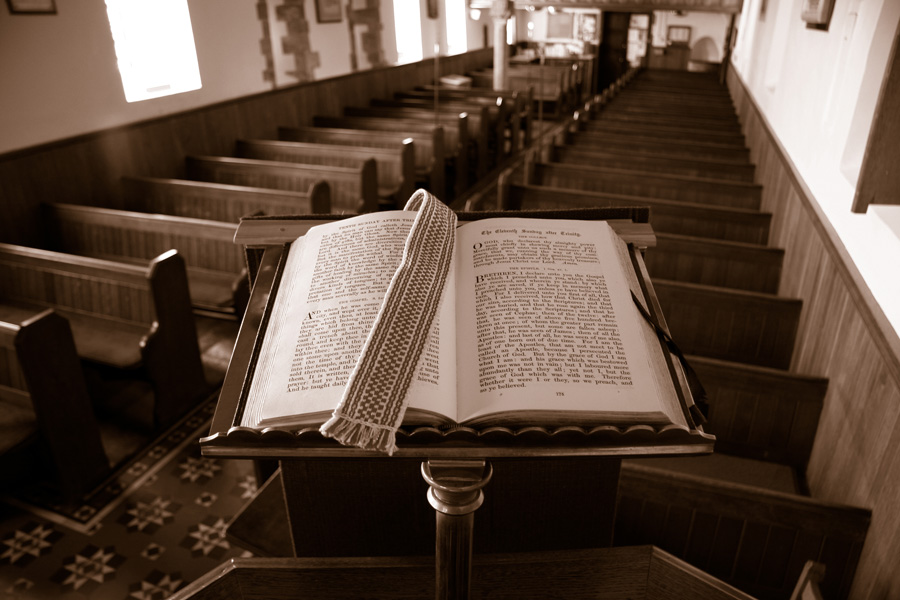
8.4—Fall 1995
The Demise of Biblical Preaching
Distortions of the Gospel and its Recovery by Donald G. Bloesch
calling all readers
Please Donate
"There are magazines worth reading but few worth saving . . . Touchstone is just such a magazine."
—Alice von Hildebrand
"Here we do not concede one square millimeter of territory to falsehood, folly, contemporary sentimentality, or fashion. We speak the truth, and let God be our judge. . . . Touchstone is the one committedly Christian conservative journal."
—Anthony Esolen, Touchstone senior editor





